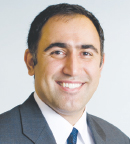Ivosidenib, an isocitrate dehydrogenase-1 (IDH1) inhibitor, yielded durable and molecular remissions in some patients with IDH1-mutated advanced relapsed or refractory acute myeloid leukemia (AML). At a dose of 500 mg/d, ivosidenib was associated with a low frequency of grade 3 or higher treatment-related adverse events, in a phase I dose-escalation and dose-expansion trial.1

Daniel Pollyea, MD
Although this was a phase I trial, the results were greeted enthusiastically at the 2018 ASCO Annual Meeting, because the study showed favorable outcomes compared with historical outcomes in relapsed or refractory AML. The study was published online in TheNew England Journal of Medicine2 to coincide with the presentation at the ASCO meeting. At the ASCO meeting, Daniel Pollyea, MD, of the University of Colorado, Denver, presented data on an additional 6 months of follow-up after the published manuscript was submitted.
“Both responders and those who didn’t respond to ivosidenib achieved transfusion independence. Ivosidenib was well tolerated, and adverse events were managed with standard of care. There are multiple ongoing studies of this drug,” Dr. Pollyea revealed.
Study Background
This is the second IDH inhibitor to show promise in AML. Enasidenib (Idhifa), an IDH2 inhibitor, was approved this past year by the U.S. Food and Drug Administration for adults with relapsed or refractory AML with an IDH2 mutation, which accounts for about 9% to 13% of all AML patients. Ivosidenib is an oral inhibitor of the IDH1 mutation, which is found in about 6% to 10% of the AML population.
The data Dr. Pollyea reported were based on efficacy in 179 patients in the dose-expansion phase plus an additional 35 patients enrolled in the dose-expansion phase after the manuscript was submitted to The New England Journal of Medicine.
All patients were treated with 500 mg once daily. About two-thirds had primary AML, and one-third had secondary AML. About 60% were refractory to initial induction or re-induction therapy. The rate of concomitant mutations was as expected, Dr. Pollyea said. About 7% had FLT3 mutations, 22% had NPM1 mutations, and 2% had CEBPA mutations. At the most recent data cutoff in November 2017, 10% of patients remained on treatment; 10% went on to stem cell transplant.
Safety and Efficacy
“Adverse events regardless of causality were what one would expect in relapsed or refractory AML,” Dr. Pollyea said. “You might expect an unusual side-effect profile with a drug that has a novel mechanism of action.” A total of 98% of patients had an adverse event. Noteworthy adverse events included the IDH differentiation syndrome, prolongation of the QT interval, and leukocytosis. These events were managed with appropriate supportive care.
IDH differentiation syndrome of grade 3 or higher occurred in 3.9% of patients, greater than grade 3 QT prolongation occurred in 7.8%, and greater than grade 2 leukocytosis occurred in 1.7%. The majority of patients with grade 2 or higher QT prolongation were exposed to other medications that prolonged the interval. The majority of patients with IDH differentiation syndrome were able to respond to ivosidenib after being treated with supportive care.
NOVEL THERAPY FOR AML
- Ivosidenib, a potent IDH1 inhibitor, showed safety and efficacy in a phase I study of patients with relapsed or refractory acute myeloid leukemia.
- Ivosidenib achieved durable responses in some patients and transfusion independence in responders and nonresponders.
- Toxicity was acceptable and manageable with supportive care.
- Future studies will evaluate this drug earlier in the course of disease and in combination therapy.
The median follow-up of the efficacy population was 9 months. The objective response rate was 41.6%. The complete remission rate was 32%, and the median time to remission was 2 months. The median duration of response was 8.2 months. The objective response rate was 42%. At 12 months, 44% of patients who achieved complete response remained in complete response.
The median overall survival was 9 months. With the 79 additional patients and additional follow-up, the median overall survival for patients who achieved complete response was 18.8 months.
All patients with complete remission were transfusion-independent. Fifty percent of non–complete response responders achieved transfusion independence, and 17.5% of nonresponders achieved transfusion independence. “Both responders and nonresponders achieved transfusion independence. This is a big achievement in terms of quality of life,” Dr. Pollyea told listeners. ■
DISCLOSURE: Dr. Pollyea has served as a consultant or advisor to AbbVie, Agios, Argenx, Celgene, Celyad, Curis, Pfizer, and Servier and has received institutional research funding from Agios and Pfizer.
REFERENCES
1. Pollyea DA, et al: Ivosidenib in mutant IDH1 relapsed/refractory acute myeloid leukemia. 2018 ASCO Annual Meeting. Abstract 7000. Presented June 2, 2018.



